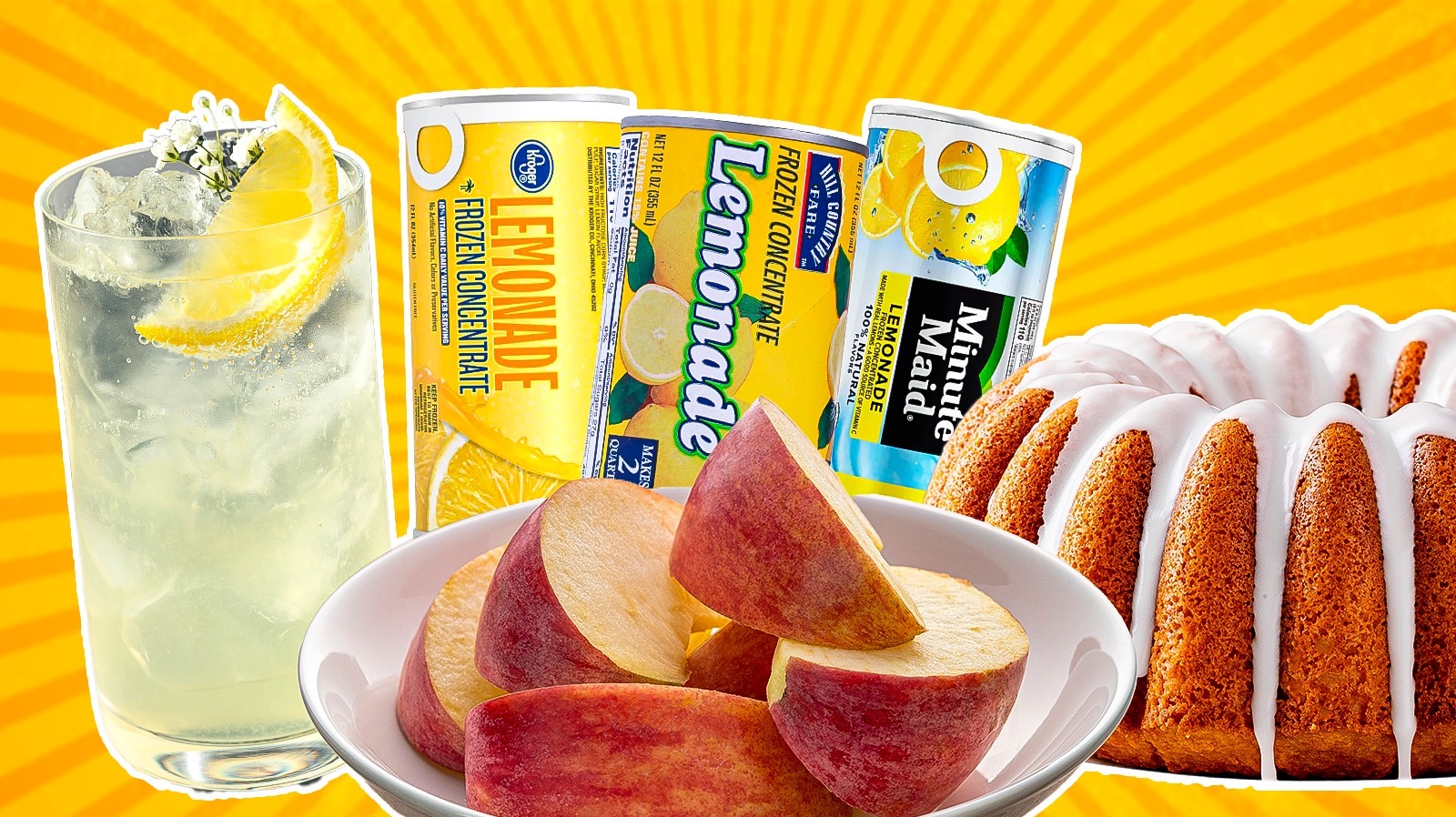The frozen aisle at the grocery store is like a treasure trove of products, some of which you may have never thought would come in a frozen variety. One such item is frozen lemonade concentrate. The grocery store already sells bottles of lemonade (in seemingly every flavor imaginable), so why would anyone ever need to buy one of these cans?
The truth is that canned lemonade concentrate, like all good grocery store products, has a time and a place. It’s important to first note that canned concentrate is not the same as regular lemonade; it is made by cooking down lemon juice and sugar into a thick syrup before canning it. Then, when you’re ready to make lemonade, you can just place some of the concentrate into a container with water and voilà. Fresh lemonade is at your fingertips — all without having to painstakingly juice lemons and second-guess how much sugar you’re adding.
In truth, we’ve never seen anyone ever buy or use canned concentrate from the store. But, in an effort to give this forgotten-about product some more air-time, we cultivated a list of the best ways to use it to enhance your favorite recipes, both sweet and savory.
Use canned lemonade concentrate as a filling for pie
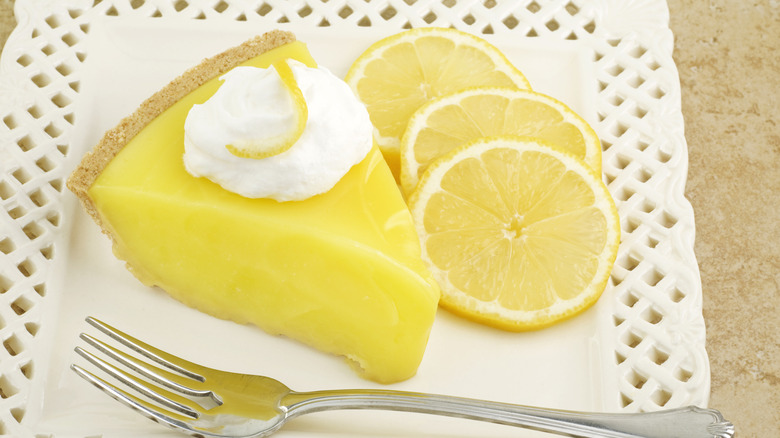
There’s no better way to cool off on a hot summer day than with an ice cold lemonade. Unless, of course, that lemonade comes in pie form.
This recipe is like a take on icebox cake, but it’s made with all the classic pie fixings. You can opt for a homemade pie crust, or go for a store-bought graham cracker one to save yourself the aggravation. Combine canned sweetened condensed milk and a bit of whipping cream in a bowl before stirring in your (still frozen-ish) lemonade concentrate.
The key here is not to allow the concentrate to melt too much, as it will cause the filling to sink down into the pie crust and turn everything watery before it has a chance to set. Dollop some extra whipped cream on top or make a sophisticated garnish with candied lemon pieces before serving.
Try a simple boxed cake mix hack to transform your lemonade
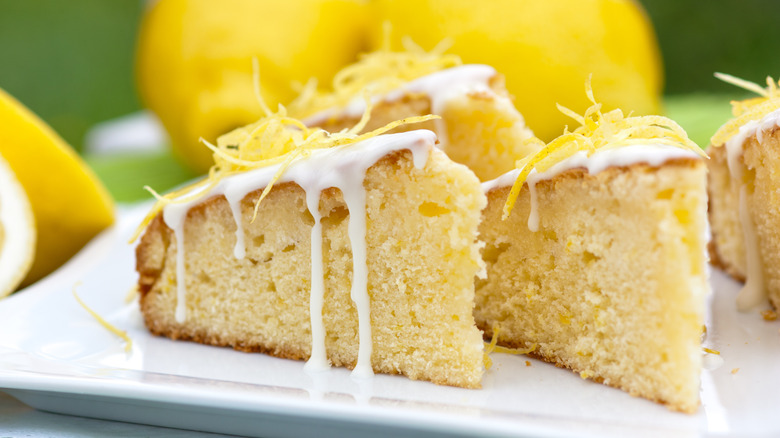
You should never underestimate the power of boxed cake mix. Not only can you use it to whip up some of your favorite classic cakes, including red velvet and devil’s food, in no time flat, but you can play with different ingredients to make a cake with a unique texture or flavor. One of these ingredients, believe it or not, is frozen lemonade concentrate.
Start with a box of cake mix. You could go with a lemon cake flavor, but a white or yellow cake will give you more of a subtle lemon undertone. Add your thawed concentrate to the mix, along with any ingredients the cake mix calls for. Since the concentrate is already liquid enough, you likely won’t have to add any additional water, so just stick to the butter or oil and the eggs. You can dress it up with a classic frosting or choose a simple lemon glaze to accent your soft, fluffy sponge.
Mix lemonade with apple slices to prevent them from browning
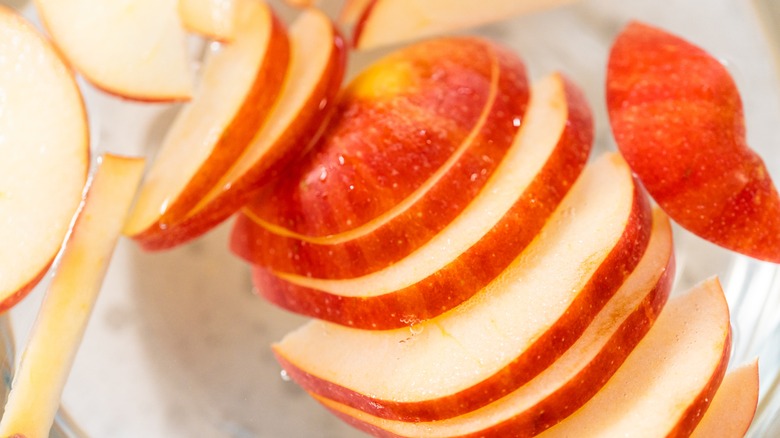
One of the most frustrating parts about cutting apples isn’t trying to careful remove the core with a paring knife or attempting to peel the apple in one shot; it’s trying to keep the apples from browning after they hit the bowl. This oxidation process is natural — meaning the apples are still good to eat — but the brown color definitely makes the sliced fruit less appealing.
Luckily, lemonade concentrate is one ingredient you can use to keep your apples from browning. The lemon juice, a key ingredient, contains ascorbic acid. This compound prevents the browning enzyme in the apple from reacting with the surrounding air. The benefit of using this sweetened product over the classic go-to, plain lemon juice, is that the sweetness can offset from the puckery flavor, while the fact that it’s concentrated means you’ll have to use less of it than if you used traditional lemonade.
There are several different ways that you can go about adding the lemonade concentrate to your apples. While you could soak the pre-cut slices in the thawed lemonade, this will cause your apples to taste like, well, lemonade. A quick spray or brush with lemonade, though, will ensure that your apples look their best and retain that classic apple taste.
Use it as a mixer for your favorite cocktail
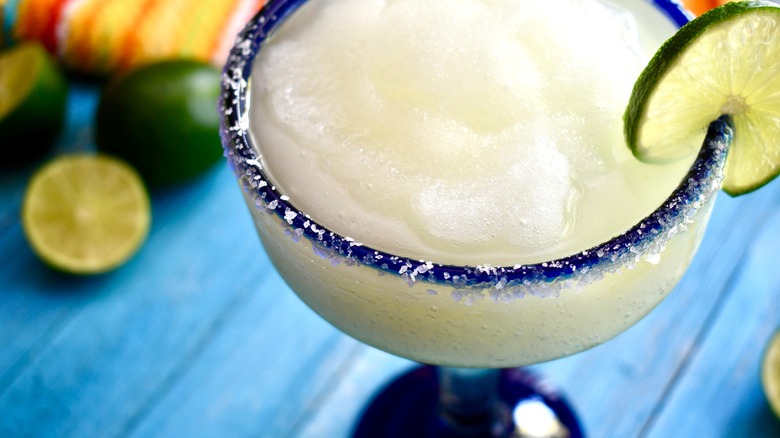
Jmcanally/Shutterstock
Summertime is not only a time of sipping a glass of lemonade by the pool but also indulging in something a wee bit stronger. Instead of making yet another mixer for your favorite cocktails, turn to your can of frozen lemonade concentrate instead. You can easily spike the lemonade with bourbon for a boozy take on a refreshing favorite; the sweetness of the lemonade will help tame the oaky, strong notes from the liquor. You’ll want to add the entire container of frozen lemonade, still frozen, into your blender with bourbon and a dash of honey. As everyone knows, cold things don’t last long on a sweltering summer day, so you may want to add a couple of handfuls of ice to your blender, too.
Don’t put your blender away just yet. You can also add frozen lemonade concentrate to it with a pour of Triple Sec (or Cointreau) and tequila for a lime-less take on a margarita. As with the spiked bourbon cocktail, you can always add in extra ice to keep things frosty.
Use canned lemonade as a brine for chicken
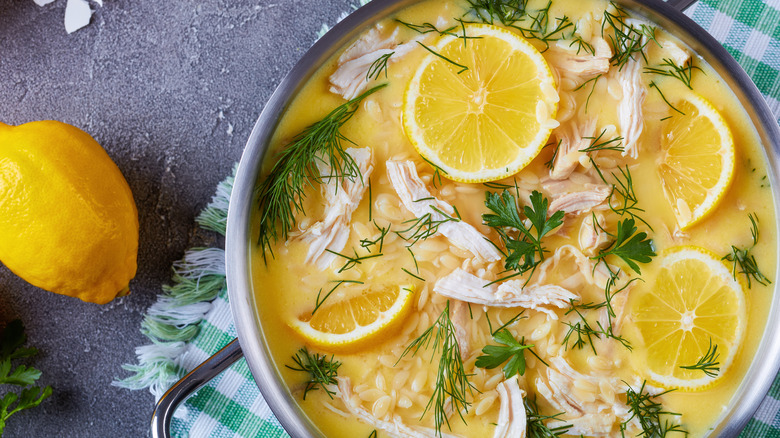
Brining chicken is an important way to add extra flavor to an otherwise dull protein. While you can opt for a medley of seasonings or a store-bought marinade to add extra flavor to your bird, lemonade is the unique ingredient you need to try for a zesty chicken brine.
At first, you might wonder why pairing chicken and lemon is a good idea. But, without this duo, there wouldn’t be lemon pepper wings or lemon chicken pasta. When used as a brine, this beverage does double duty. The acidity helps tenderize the protein, while the sugar imparts a subtle sweetness that cuts the tartness. If you’re not a big fan of this unique flavor combo but still want to reap all of the functional benefits of the sugar and the lemon juice, try adding your own spin on the brine with ingredients like miso paste, soy sauce, and tamari.
Swirl it into your punch

If you remember high school prom, you probably remember the flowing, colorful dresses, animosity surrounding who would be selected for prom court, and the like. The punch bowl probably wasn’t the topic of conversation — and for good reason. But it’s about time punch got a facelift. And there’s no better ingredient to give it one than frozen lemonade concentrate. The concentrate is sweet, syrupy, and the perfect accent to an effervescent lemon-lime soda.
All you need to build your perfect punch is a large enough bowl, soda, and your lemonade concentrate. You can play with recipe variations by blending fruit, like strawberries or peaches, into the mixture. The frozen lemonade concentrate has several important roles in this recipe. Mainly, it helps keep the contents of the bowl cold while diluting some of the sweetness of the soda. While you can add the frozen concentrate to the bowl first (along with any other juice concentrates, like orange and lime), you’ll want to hold off on pouring the soda until you’re ready to serve so that each sip is super fizzy.
Add a tangy element to your frozen sorbet or ice cream recipe
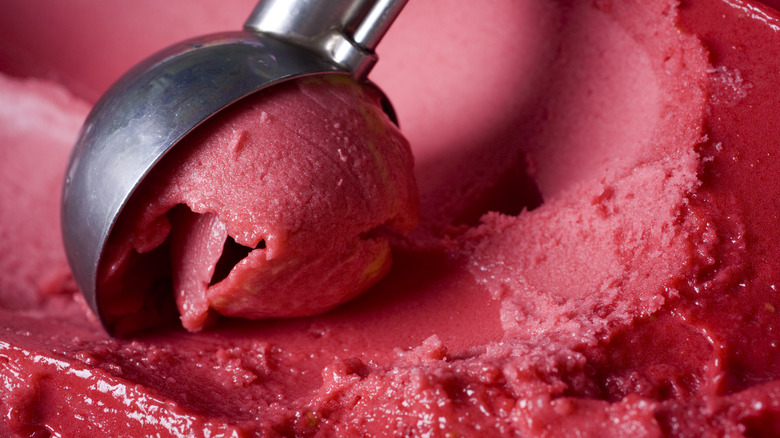
Homemade ice cream and sorbet is an act of love — especially when it’s so easy to drive to your local grocery store, grab a pint of your favorite flavor, and dig in. But making your own recipe at home allows you to tinker with the sweetness and ingredients to bring out a newfound complexity in this classic dessert.
Frozen lemonade concentrate can act as a shortcut in your refreshing homemade sorbet recipe because it the perfect combination of sweetness and tanginess. And honestly, this variation couldn’t be any easier. You’ll want to bring the concentrate up to room temperature (it will be frozen again later, don’t worry). Add some extra honey and water and pop it into a food processor so that it gets perfectly smooth. From there, you can transfer it to your freezer, and you’ll have a quick dessert ready in a matter of hours; just be sure to stir and agitate it often so that it stays soft.
Pour a splash of lemonade concentrate into your grains for extra acidity
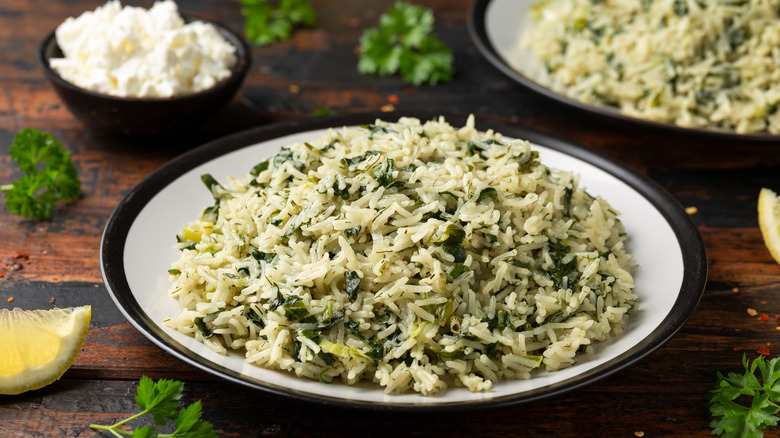
A side dish of rice, quinoa, or your other favorite grain can be just that — a side. But it doesn’t have to be. Experimenting with flavors, herbs, and seasonings can really breathe new life into this ho-hum accompaniment and make it something that you truly want to eat rather than something you feel that you have to eat — just because it’s served at the table.
A small (emphasis on small) splash of frozen lemonade concentrate can help perk up your grains, add a subtle lemony flavor, and bring a hint of sweetness that will highlight the savory and umami elements of the dish rather than turn your side into a dessert. There are several different options for cooking with this ingredient. You can either add it to the rice right before serving for the most unadulterated flavor. Or, you can cook the grains with the lemonade as a flavoring. The latter will require you to dilute the concentrate with water, but you’ll still get a subtle lemon flavor, which is delicious when accented with fresh herbs or veggies.
Transform your lemonade concentrate into a quick and easy salad dressing

Think about the best salad dressing you’ve ever had. There’s probably something tangy, something savory, and, if you’re lucky, something sweet. Frozen lemonade concentrate is a one-stop shop that checks off two of these boxes — and you can always scour your pantry to round out the umami or the savory notes to finish off the list.
One of the most seamless dressings you can make with this canned product is lemon poppy seed. Just add your thawed concentrate to a food processor with a scant scoop of Dijon mustard. Making a properly emulsified sauce with oil is key here since you want a dressing that stays together rather than separates. And if you notice that the two inevitably do separate, just give it a quick shake before you pour it on your fresh greens. You can also add a bit of lemonade concentrate to a sauce that doesn’t scream “lemon,” like an Asian sesame dressing that yearns for something acidic and subtly sweet.
Drizzle a little bit into your frosting for a lemon twist
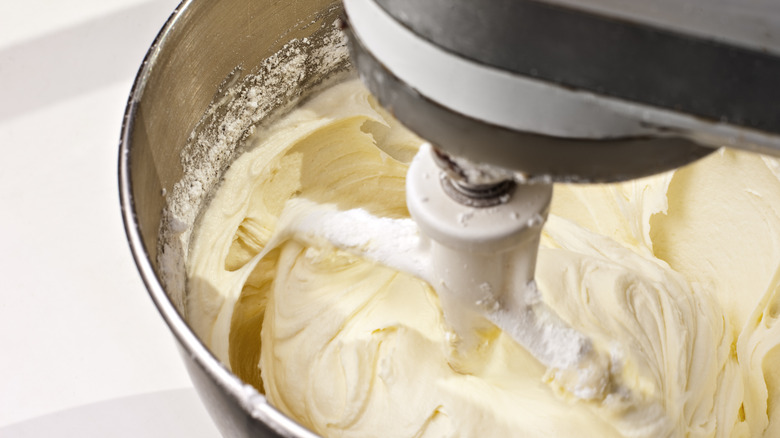
A plain, classic vanilla buttercream frosting does the trick for many cakes. But, if you’re experimenting with fruity flavors and are seeking a reprieve from the cloying sweetness of traditional frosting, you may consider a lemon-flavored one instead. Lemon extract will surely give you a lemon flavor, but being too heavy-handed with this very potent ingredient can make your frosting taste far too strong. If you’re seeking something a little more forgiving, try adding a bit of thawed lemonade concentrate to your batch.
You’ll only need to add a couple of tablespoons to the frosting to get the perfect flavor and texture. While buttercream is a blank canvas for experimenting, this lemonade hack also works for cream cheese frosting. This frosting would make a great pairing for a blueberry or strawberry cake or a delicate angel food cake because it adds a subtle hint of lemon without being too overpowering.
Toss fruit salad with lemon juice to highlight the sweet flavors
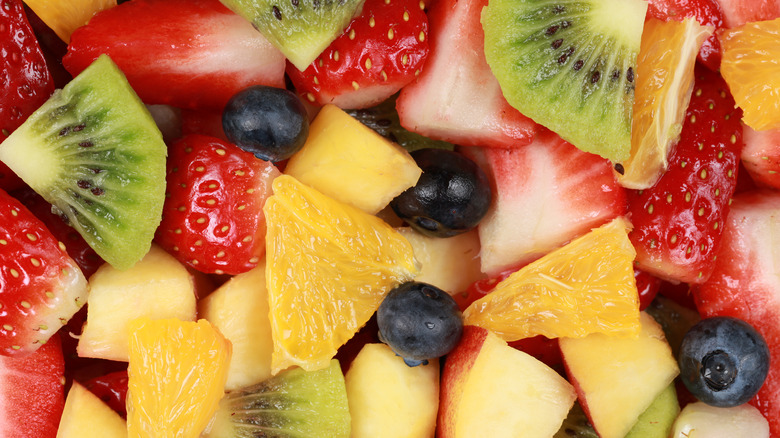
Fruit salad is one of the most simple-yet-underrated desserts out there. The only prep you really need to do is to chop your fruit and keep things cool until you’re ready to serve. But there are always ways to take even the simplest recipes to the next level.
One of the best methods for elevating your fruit salad is to toss it with thawed lemonade concentrate before serving. This ingredient does double duty in this recipe. It slows down the oxidation of the fruit, which will keep the colors super vibrant, and it also adds a contrasting tang that balances out the sweetness of the fruit. The amount of lemonade concentrate you add is really dependent on the fruit salad you’re making. You don’t want to drench everything so that it looks like you just added fruit to your glass of lemonade, but you want to be sure each bite has the perfect zesty flavor.
Make a lemonade glaze for your favorite baked goods
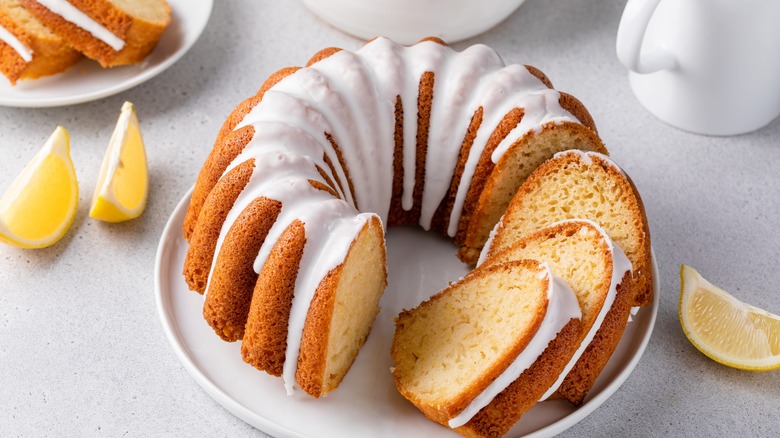
Some baked goods don’t warrant a thick coating of frosting — and that’s totally fine. If you want to step up your bundt cake, quick bread loaf, or similar dessert, turn to a simple glaze instead. Unlike traditional frostings, glaze is made with a simpler, less bulky list of ingredients, including powdered sugar and some sort of liquid. Moreover, this simplicity allows you to play with different flavors and juices instead of just using plain milk.
One zesty variation on the classic glaze is to use thawed lemonade concentrate instead of milk. Whisk the two ingredients together well to ensure that there are no clumps left before pouring it on your completely cooled dessert. While many variations of lemon glaze will use lemon juice rather than lemonade concentrate, it’s clear that being too heavy-handed with the juice can turn your glaze sour. Since your lemonade is already sweetened, the impacts of this mistake are a bit more cushioned.
Use frozen lemonade concentrate to give your cheesecake a subtle brightness
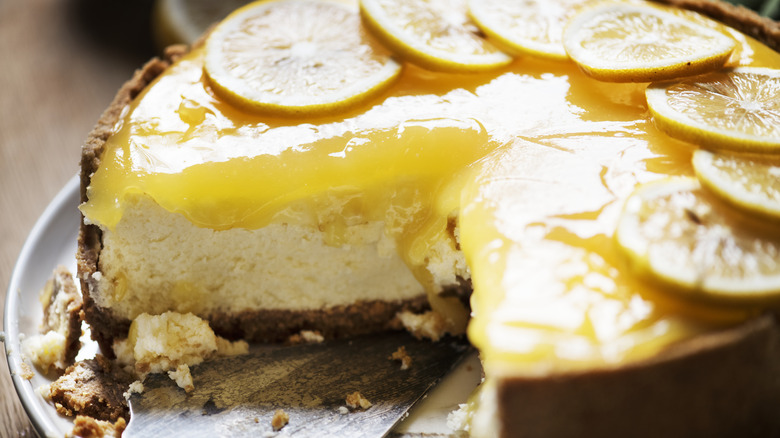
Cheesecake is delicious, no matter which way you slice it. But plain cheesecake can get old fast. If you want to save your tastebuds from the monotony of each bite, try uplifting your cheesecake with the help of frozen lemonade concentrate. The can will bring out the underlying citrus notes that make each bite refreshing, but it won’t make the cheesecake so tangy that lemon haters will say no to a slice.
This hack works best for a no-bake cheesecake, as it tends to be more forgiving with liquid ingredients than one you have to bake. Whip the concentrate into your filling along with cream cheese and any additional thickeners like whipped cream, pudding mix, or even sour cream. If you like your cheesecake to taste as good as it looks, try topping it with lemon curd or candied lemon slices.
Whip up a glaze for roasted vegetables using your concentrate
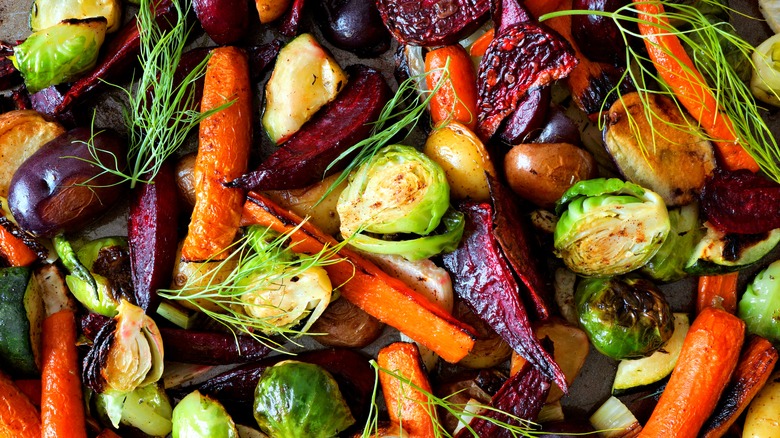
One of the best ways to add extra flavor to your vegetables is to roast them. A quick coating of olive oil and trip in your oven will bring out the natural sweetness of foods like carrots and sweet potatoes and mellow out the flavor notes of sharp, cruciferous notes of cauliflower and Brussels sprouts. But you don’t have to stop at roasting; you can also add a glaze to your veggies for an extra layer of flavor and a way to easily segue your side into the other components of your entrée.
Thawed lemonade concentrate can add an acidic and sweet pop to your veggies, thus replacing citrus juice and other sweeteners like honey, maple syrup, and agave. Try pairing your concentrate with spicy and savory additions, like Dijon mustard, soy sauce, tamari, and even tahini, to create a well-rounded dressing fit for a variety of different veggies.
Try making a compound butter for your baked goods
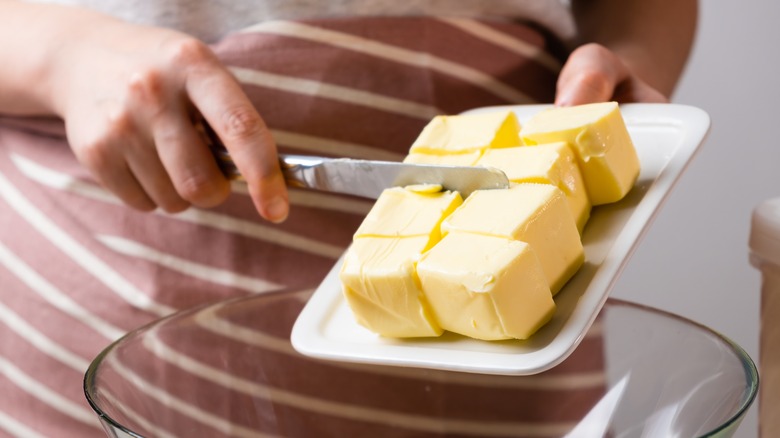
Vladimka production/Shutterstock
Have you ever thought about how much butter you actually use in the kitchen? For many folks, it’s a must-have schmear for toast and baked goods like muffins, biscuits, and scones. But, rather than using plain ol’ sweet cream butter for your spread, try upgrading its flavors by making compound butter. Adding an ingredient, like lemonade concentrate, in will easily influence the flavors and transform your butter into something much more exciting and more flavorful.
To make this compound butter, you’ll want to start by whipping up a stick or two of slightly softened butter. Then, add a few tablespoons of the thawed lemonade concentrate. It’s important to note that too much liquid may affect the texture of the butter, so you’ll want to stop at a couple of tablespoons and supplement additional lemon flavor with lemon zest, oil, or the like. This butter tends to lean sweet because of the sugar in the concentrate, but you could also add extra herbs like basil to add a savory edge. Besides baked goods, this lemonade compound butter makes a great spread for fish, steak, or even pasta.
Upgrade your whipped lemonade with a bit of concentrate
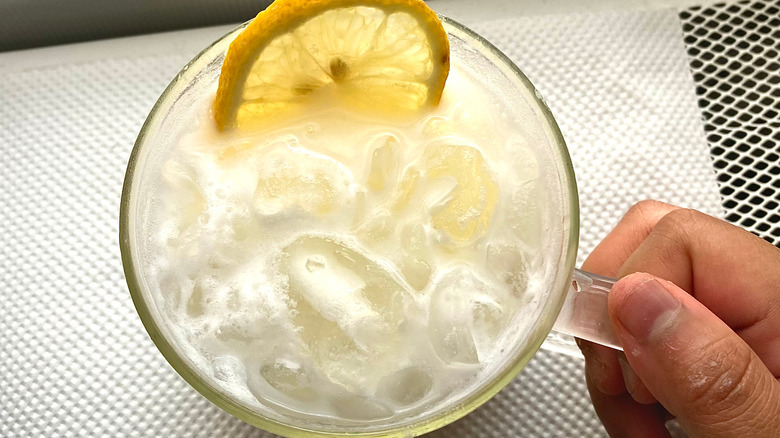
Nafeeha helmi/Shutterstock
Lemonade is refreshing on a hot summer day, but it doesn’t hold a candle to whipped lemonade. It’s the fancy and fluffy upgrade to the classic summer drink that you need to try. The key to making this drink is to blend the frozen lemonade concentrate with something to make it “fluffy” — like sweetened condensed milk or whipped cream. You can even try adding in a scoop of your favorite vanilla ice cream to give it a float-like consistency, or go boozy with an alcoholic addition like gin.
Frozen lemonade recipes often start out with using regular ol’ lemonade instead of the frozen concentrate variety. But the latter is a far better option because the sweetness is more apparent, which means you won’t have to play with additional honey or agave. Plus, it’s already frozen. So, if you like to keep things cold, add an extra handful of ice to your blender and you’ll have a frozen treat that’s as refreshing as it is sweet.



